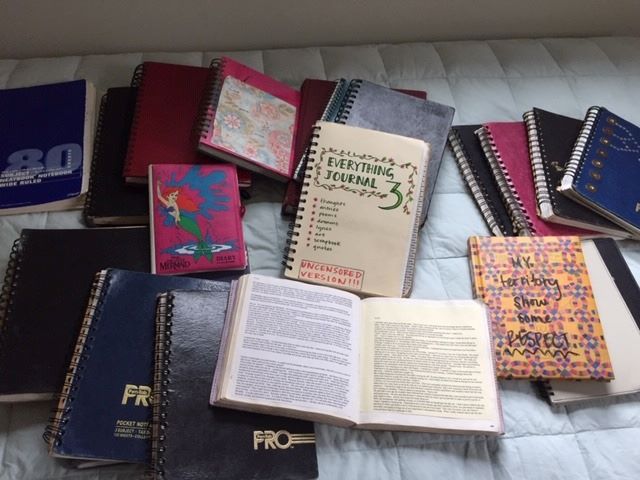
I am sharing a few thoughts on a book called, Reckless Grace: A Mother’s Crash Course in Mental Illness by Carolyn DiPasquale. The book follows the lives of a mother (Carolyn) and her daughter (Rachel) in a unique way. I am hard pressed to find a comparison to give that would help, but as I do, one book comes to mind- a book I read in high-school, “Go Ask Alice”. However, that is too limiting, first because this is not fictional story, but the true as can be told reality lived out by a mother, daughter, and family and carefully brought forward with tireless dedication. One could say, an incredible journey.
In this book you have three perspectives working together to bring forward the events in time and to present an enlightening and cautionary memoir. The perspective of a mom writing in retrospect as she reads her daughter’s journals, and pieces together a timeline that took, I estimate, a good part of seven years or more to complete. You have the perspective of a daughter as she shares her personal journey, with multiple coinciding physical and mental health issues, transparently. Many of the chapters are the writings from these journal pages, now published after her death. Finally, there is a third perspective which I believe is the combination of time it took to bring this book to fruition and the thorough, detailed work of the author that comes through, almost like an investigative reporter who assisted Carolyn in the work. The book is exhaustive in its detail of the journey shared by mother and daughter and although Carolyn wrote this book after the tragic loss of her only daughter, Rachel, her hope is to light a path those struggling in the throes of mental illness and/or substance abuse while raising awareness for everyone.
The book opens with the end of Rachel Grace Wilke’s life, as her mother, in the shocked numbness that follows sudden loss grapples to get through the days of planning details which come with such things. Sudden loss is difficult but especially that of a child, regardless of their age. It is always a tender and painful loss. But for those who have also endured a journey of heartache, on the rollercoaster ride that is the state of mental health and substance abuse treatment it is especially difficult. Often there is the hope of healing, or improvement before many of these tragedies occur. And this was the case with Rachel. After a long battle with multiple mental health challenges which were complicated and sometimes misdiagnosed or missed by medical professionals we see a glimmer of hope, and then her tragic death.
I would not say this is an easy read but for the person who wants a clearer picture of the many subtle (and not so subtle) forces working within the world of mental health illness, treatment, diagnosis, confusions, and perceptions this is an eye-opening and heartbreaking reality check.
The format can be challenging at times as it is riveting as you deep-dive into the events but Carolyn’s writing swings from poetic prose to technical medical writer at once bringing the reader into the times and places, but also elaborating and educating along the way. We experience the raised eyebrow of surprise at the failures in treatment, and incompetencies in care. We are transported back and forth in time and perspective throughout the four hundred pages. There are times I needed to take a break when I read this book for the first time. I believe this is partly due to the proximity of my reading it so soon after my daughter’s death. There were parts that brought to mind many of the experiences, challenges and struggles we went through. Though each unique in their own rights.I read through a second time with Audible this year and was clearer on the unique aspects of Rachel’s journey to adulthood and her complicated relationship with herself, her medical condition as an insulin dependent diabetic from childhood, and her multiple mental health illnesses which drove her further and further away from the good things she desired and was capable of this side of eternity.
Rachel struggled with two eating disorders. The first bulimia, the second is unique to those who have diabetes, and is called diabulimia. Both of these illnesses are forms of disordered eating which can cause serious and permanent health conditions when untreated and even death. The name diabulimia is not currently included in the Diagnostic and Statistical Manual of Mental Disorders (DSM-5), though cases are on the rise. Diabulimia occurs when someone is insulin dependent but skips or manipulates their insulin (medicine) to control their weight.
In addition to these illnesses Rachel struggled with a progressively worsening borderline personality disorder eventually turning to substance abuse and other addictive, compulsive behaviors as a form of escape from the torment of her multiple issues.

In Rachel’s journals we see her struggles in real time as she lives them. She leaves a gift, beyond the gift of who she was, by sharing the often hard, torturous places of her existence. We share her joys, victories and setbacks. We see her psyche and her soul…we see her vulnerable, honest, and beautifully bold, raw and real self. It’s like watching a pendulum swing from one extreme to the other.
“Good Morning Father. Despite my frustration and confusion, I must praise you for bringing me through another day.”
“My actions and my mind are both desensitized and indescribably convoluted. It makes me very sad to spend time with people I love. I feel like I am going to die and will miss them. I want to leave an imprint on somebody; I want to leave parts of myself with someone.”
“God whispers into the ears of these leaders…how long before He squeals on me? I want nicotine and sin, liquor, and false promises.”
I am reminded in Rachel’s writings how each of us is precious in God’s sight, and even in our deepest, darkest places he longs to stay with us. Rachel’s faith shines through in glimmers, then appears distant as she succumbs to the massive weight of her illnesses and seeks escape. I appreciate her ability to bring all of herself to the pages of her journal, for better and worse, this in itself is a gift, in my opinion, as it is how we are before our Maker. I relate at times to her struggles (as well as her mother’s); she writes poetically, and beautifully. Her journal is a safe haven for her to retreat and seek answers, and ask questions of herself and God.

“Tangled impossible maze of thought
disorder,
If I cannot make sense of it
no soul ever will.
I crave to be understood,
accepted
Yet cannot accomplish the feat.“
In Carolyn’s details we gain insight into the place a parent stands, like a juggler, trying to keep all the balls in the air without dropping them, but the catch is, balls are continuously added while the shape and size are changed. Carolyn chronicles her own timeline of life events alongside Rachel’s journals which offer interesting insights into the perception differences between individuals. As Rachel continues to journal into adulthood, we have a lot to learn in her entries about those struggling with coexisting disorders- which is often the case. It also is often a big contributor leading to substance abuse. Carolyn has a technical writing background, and it comes through in her writing at times. She has done the thorough work of researching to find answers and what she uncovers holds a measure of hope for those willing to take the time to read, listen and understand. In this book, we get a powerful look into how little control we sometimes have over our children’s choices.
I think this book is a multi-genre offering being part memoir, biography, autobiography, handbook, and psychology book. The thorough manner with which Carolyn dissects and meticulously chronicles Rachel’s illnesses and offers her insights and retrospect make this a groundbreaking help for mental health professionals as well as those who are living through the psychological trauma that is currently our health care system. Rachel herself longed for her journals to release her voice into the world and gave her mother explicit permission to do so in an almost prophetic way years before she died:
“I can’t carry these secrets anymore.” and, “I would let her have my words in this book, and I can see her furiously working at publishing it.”
Rachel Grace Wilke (July 5, 1984-November 7, 2012)
Carolyn shines a light for parents, health professionals and for us all.
“More people struggle with mental illness than we might guess, some fight simultaneous battles lasting years or decades. Therefore, let us embrace the unembraceable. Let us treat them with respect, patience, and love. Let us give them grace.” (Carolyn DiPasquale)
In conclusion, I think this book is an education to the reader. It is a work worthy of your time and attention. It may present challenges in content , and preconceived ideas you may hold, but it will teach you, and that is worth it. I pray with Carolyn that it may help the parent, teacher, health professional, or any person who needs the insights most to have a better outcome.
Learn more at: recklacegracestory.com
Thank you for taking the time to read this post. If you found it helpful, please share. As I continue my elimination of social media use, it is greatly appreciated for those who are willing. EIther way, I appreciate your continued presence in my space here in the world wide web!
Enthusiastically, Dawn






